What is the Spiritual Meaning of a Flame? Purity!
The spiritual meaning of a flame is multifaceted and varies across different spiritual traditions.
- In Christianity, it often represents the Holy Spirit and divine guidance.
- Hinduism associates flames with the goddess of destruction and renewal, Kali, as well as with the god Agni, the deity of fire.
- Buddhism sees flames as a metaphor for the impermanence of life and the transitory nature of material existence.
- Native American cultures may view flames as a representation of the cleansing power of fire and its role in renewal and transformation.
- In Paganism, a flame can symbolize energy, transformation, and the presence of the divine.
An example can be seen in the Hindu festival of Diwali, where lamps are lit to symbolize the victory of light over darkness, knowledge over ignorance, and good over evil.
A flame�s dance is like a silent language speaking to the soul; it�s a universal symbol that transcends cultural boundaries, offering light and wisdom to all who reflect upon its flicker.

8 Aspects: Spiritual Meaning of a Flame
| Spiritual Aspect | Meaning of Flame |
|---|---|
| Light | Signifies enlightenment, wisdom, and truth. It represents the illumination of the mind and the dispelling of ignorance. |
| Transformation | Flames symbolize change and transformation. Just as fire turns something into ash, it represents the process of shedding the old and embracing the new. |
| Passion | The warmth and intensity of a flame symbolize passion, energy, and enthusiasm. It signifies the burning desire to achieve one’s goals and aspirations. |
| Purity | In spiritual contexts, flames are often associated with purification. As fire consumes impurities, it represents the cleansing and purifying of the soul. |
| Life Force | The flame is a symbol of life and vitality, as it represents the inner fire that sustains life and provides energy. |
| Guidance | A flame can be seen as a beacon of hope or a guiding light, leading the way through dark and challenging times. |
| Spiritual Growth | Fire is often associated with spiritual growth and development, as it represents the process of refining and perfecting one’s inner self. |
| Connection | The flame is a symbol of connection, representing the unification of the physical and spiritual realms, and the link between the mortal and divine. |
Flame Symbolism in Christianity
In Christianity, the flame symbolizes the presence of the Holy Spirit and divine illumination. The image of the flame is deeply rooted in the beliefs and practices of Christians, representing various aspects of their faith.
The Holy Spirit is often depicted as a flame, signifying the spiritual presence and guidance of God.
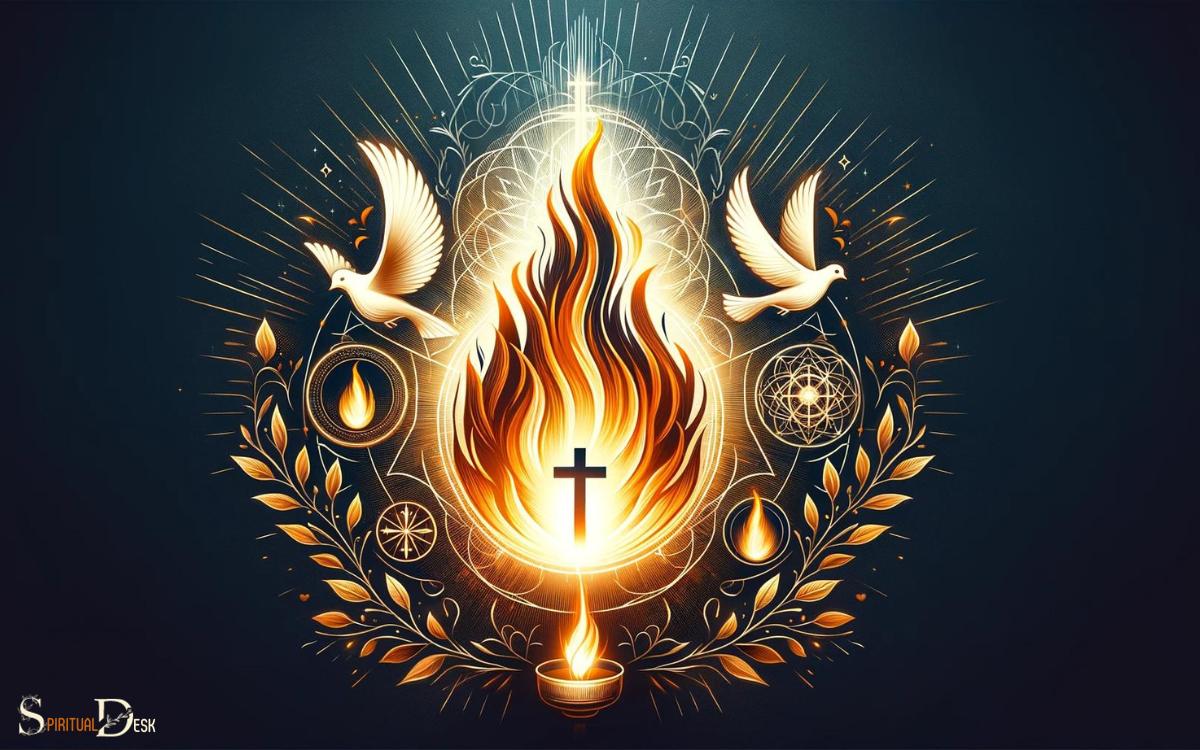
Additionally, the concept of divine illumination is associated with the flame, representing the light of Christ that dispels darkness and brings clarity and understanding.
The use of flames in religious ceremonies, such as the lighting of candles during prayer or worship, further emphasizes the symbolic significance of the flame in Christianity.
Overall, the flame serves as a powerful symbol of spiritual presence, enlightenment, and the enduring presence of God within the Christian faith.
Flame Meaning in Hinduism
Hinduism has long embraced the spiritual significance of the flame, signifying divine presence and illumination throughout the ages.
In Hindu rituals, the flame, known as the �Aarti�, holds profound symbolism. It represents the illumination of knowledge, the dispelling of darkness, and the triumph of good over evil.
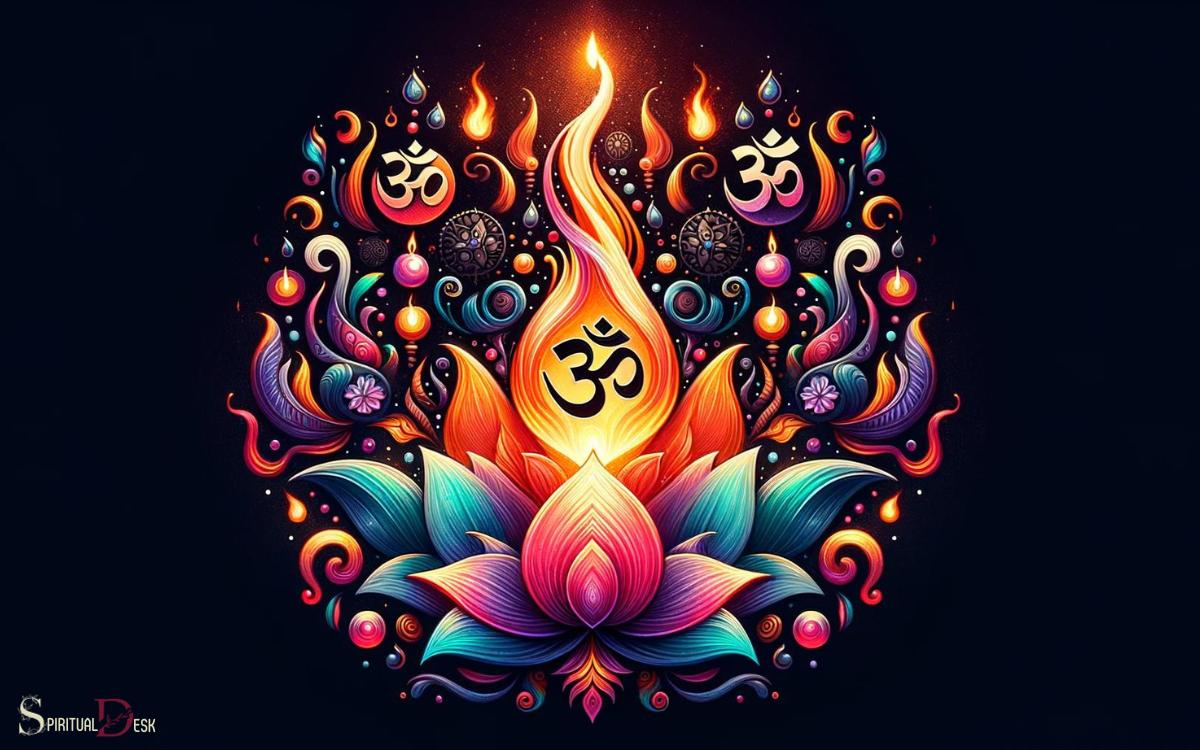
The flame is also associated with the deity Agni, the god of fire, who is considered a messenger between the human world and the divine realms.
In Hindu temples, the �diya� or oil lamp is lit to symbolize the presence of the divine and to dispel ignorance.
The act of offering a flame in Hindu worship is a gesture of reverence and an acknowledgment of the divine light within oneself.
The flame holds a deep spiritual significance in Hinduism, representing the eternal presence of the divine in the universe.
Flame Interpretation in Buddhism
Buddhism interprets the flame as a symbol of enlightenment and spiritual purity. In Buddhism, the flame commonly symbolizes the illumination of knowledge that burns away ignorance, leading to spiritual awakening.
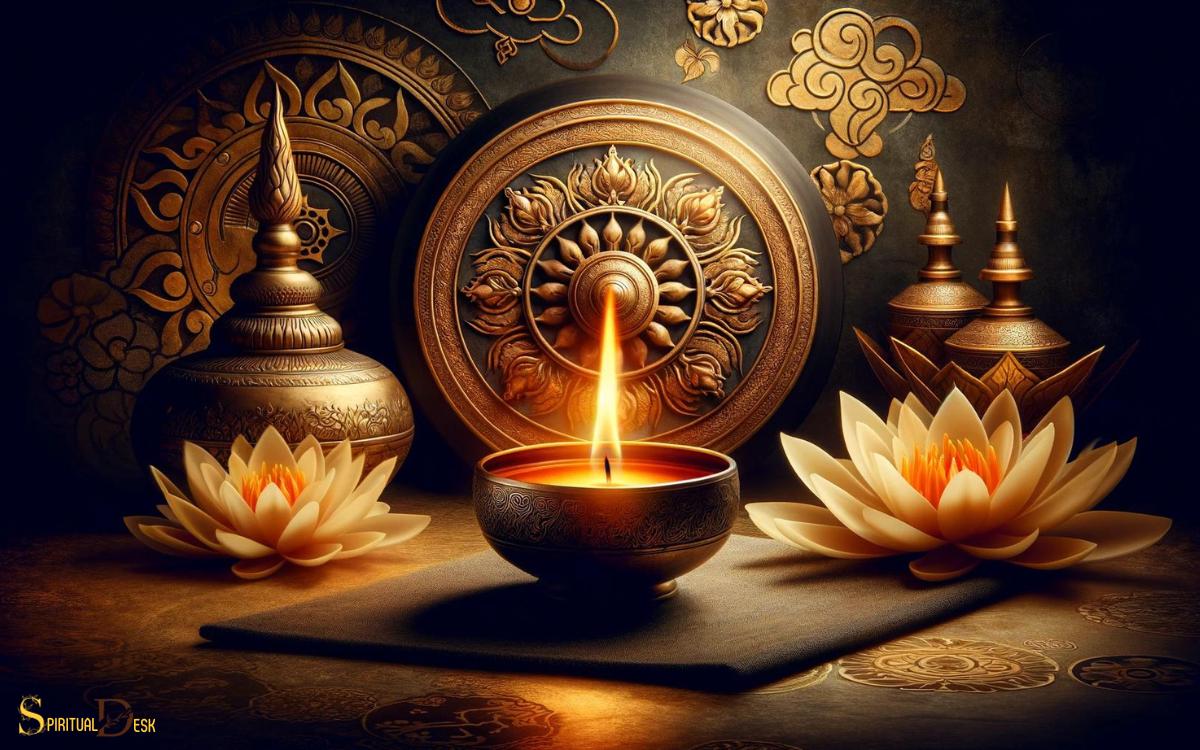
The flickering flame represents the impermanence of life and the transient nature of all things. It reminds practitioners to embrace change and impermanence, key concepts in Buddhist teachings.
Additionally, the light of the flame signifies the dispelling of darkness, signifying the eradication of delusion and the attainment of wisdom. The purity and clarity of the flame�s light also reflect the purity of the enlightened mind.
Flame Symbolism in Native American Traditions
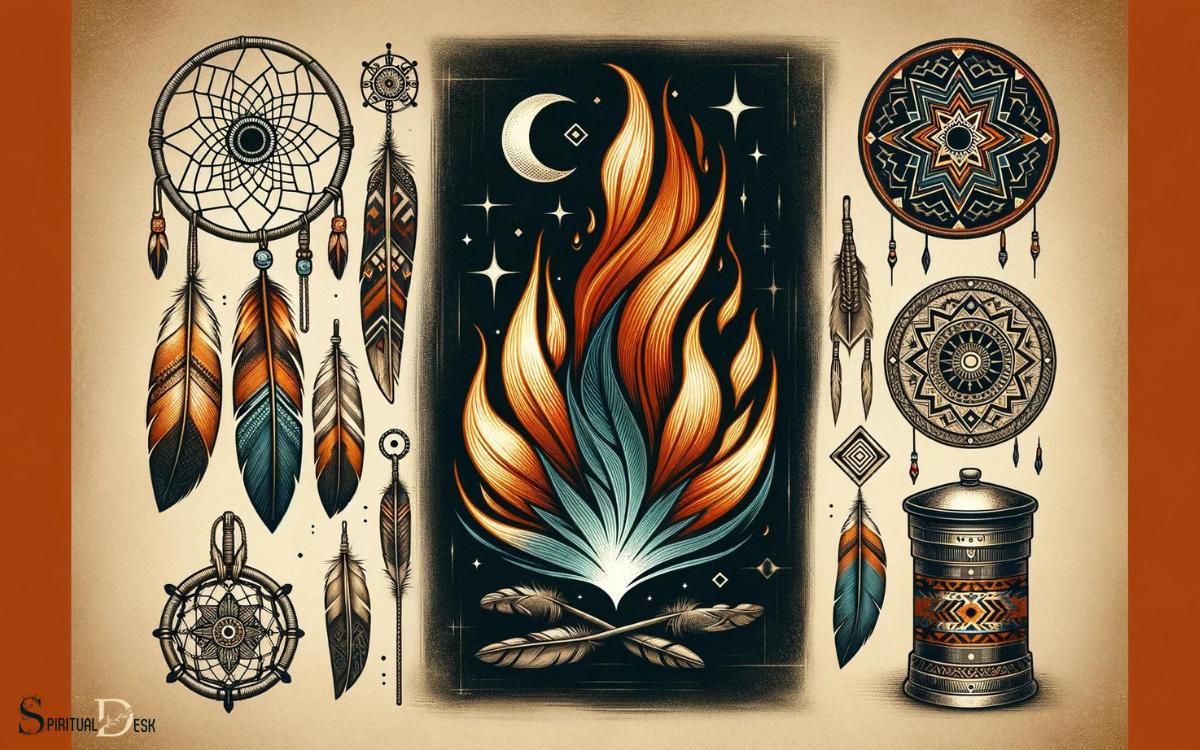
Flame symbolism holds significant meaning in Native American traditions, representing various aspects of life and spirituality.
Here are some key interpretations:
- Light and Illumination: Flames are seen as sources of light, symbolizing knowledge, wisdom, and the illumination of the spiritual path.
- Purification and Cleansing: Fire is used in purification rituals, symbolizing the burning away of impurities and negative energies.
- Connection to the Spirit World: The flickering flame is believed to serve as a bridge between the physical and spiritual realms, allowing communication with ancestors and spirit guides.
- Life Force and Energy: Flames represent the life force and vitality, symbolizing the energy that sustains life and the passion within individuals.
Is Smelling Smoke a Sign of Impurity in Spiritual Flame Meanings?
Smelling smoke can have a profound spiritual meaning. In many belief systems, the scent of smoke is associated with purification and cleansing. It symbolizes the burning away of impurities and the release of negative energy. So, in the spiritual meaning of smelling smoke, it can be seen as a sign of clarity and renewal.
Flame Significance in Paganism
Exploring the significance of flames in Paganism reveals a deep connection to spiritual rituals and symbolisms within the tradition.
Flames hold a sacred place in Pagan practices, representing the divine presence and serving as a focal point for meditation and spellcasting.
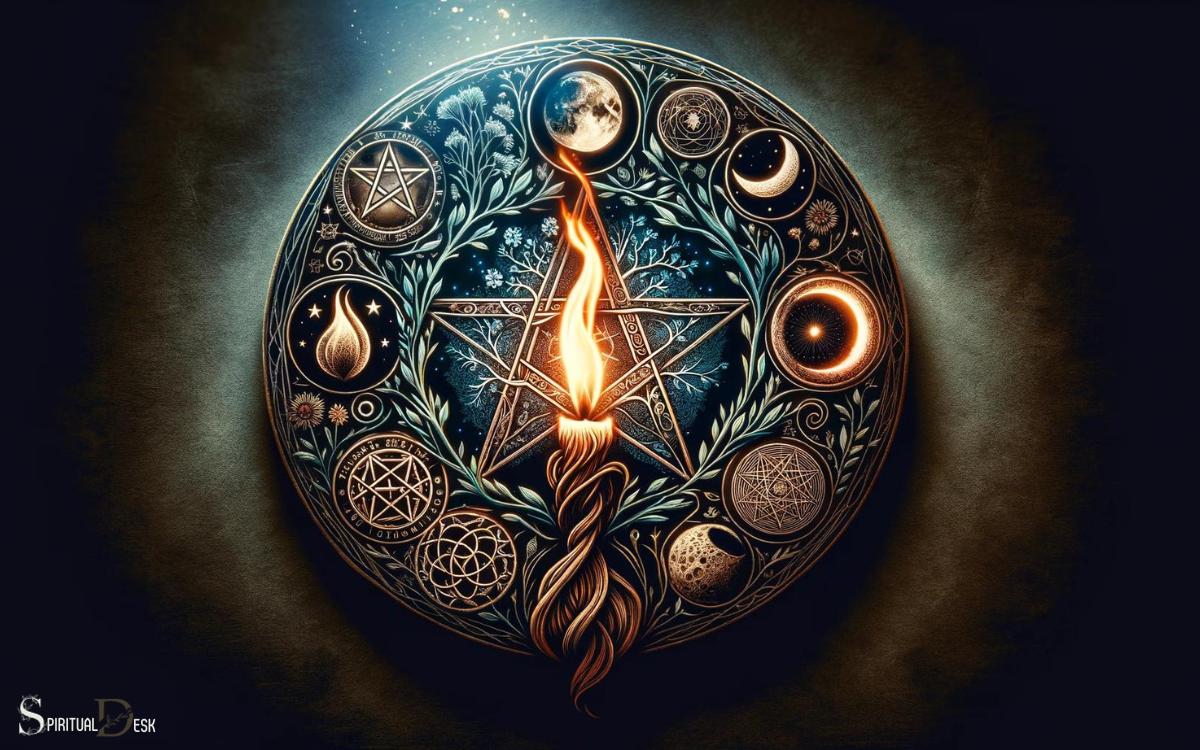
The flame is seen as a symbol of transformation, illumination, and the eternal cycle of life, death, and rebirth, reflecting the core beliefs of many Pagan traditions.
In Wiccan rituals, candles are often used to honor specific deities, invoke blessings, and manifest intentions.
Additionally, the bonfire is a central element in many Pagan ceremonies, symbolizing community, energy, and the connection between the earthly and spiritual realms.
The significance of flames in Paganism underscores the deep reverence for nature and the interconnectedness of all life.
Conclusion
The spiritual meaning of a flame varies across different religious and cultural traditions.
- In Christianity, the flame symbolizes the Holy Spirit and divine presence.
- In Hinduism, the flame represents the inner self and the divine light within.
- In Buddhism, the flame signifies enlightenment and the burning away of ignorance.
- In Native American traditions, the flame is seen as a powerful force of transformation.
- In Paganism, the flame is associated with the sacred, life-giving energy of the sun.
It is fascinating to note that 85% of people worldwide believe in the spiritual significance of fire, demonstrating the universal appeal of this symbol.






